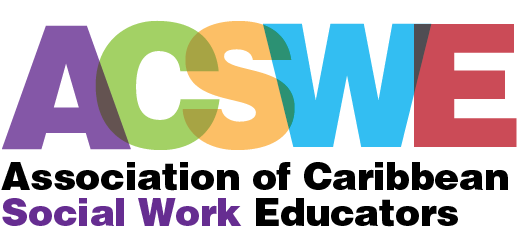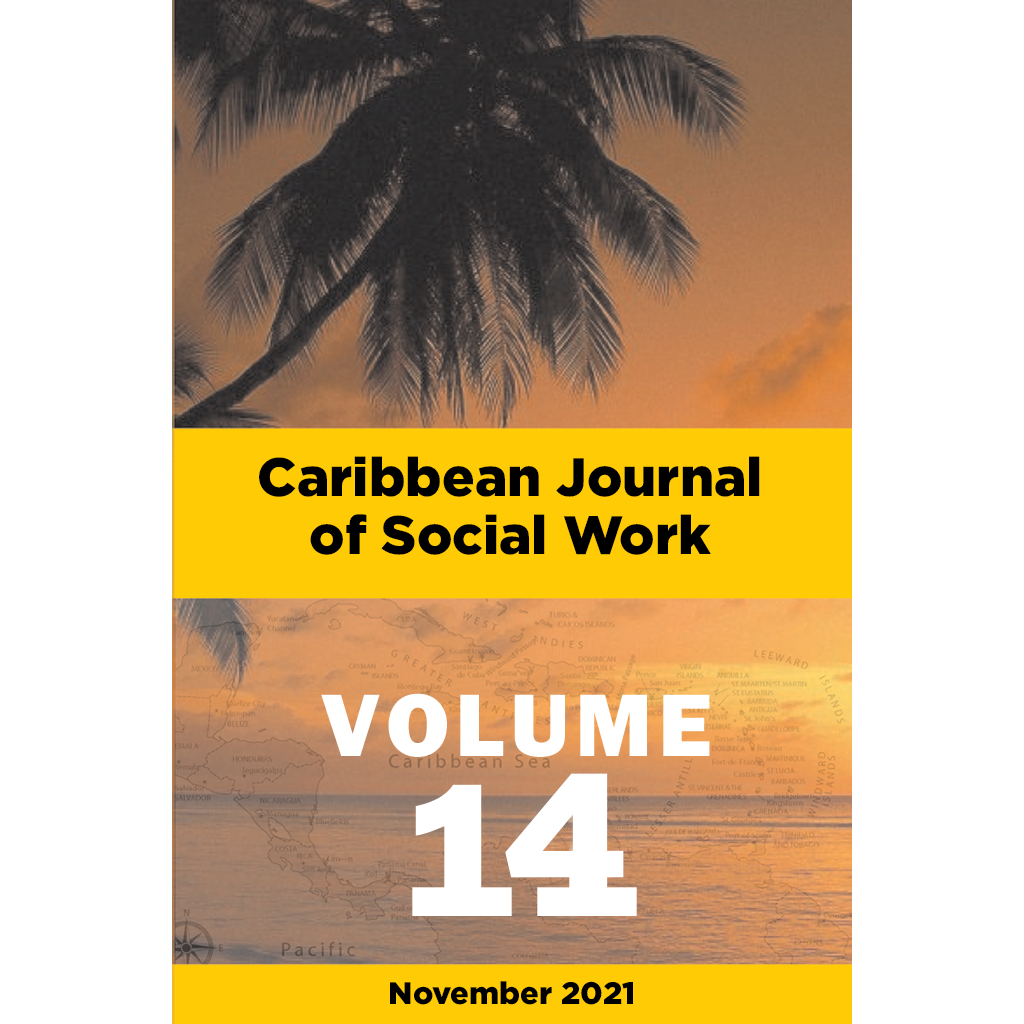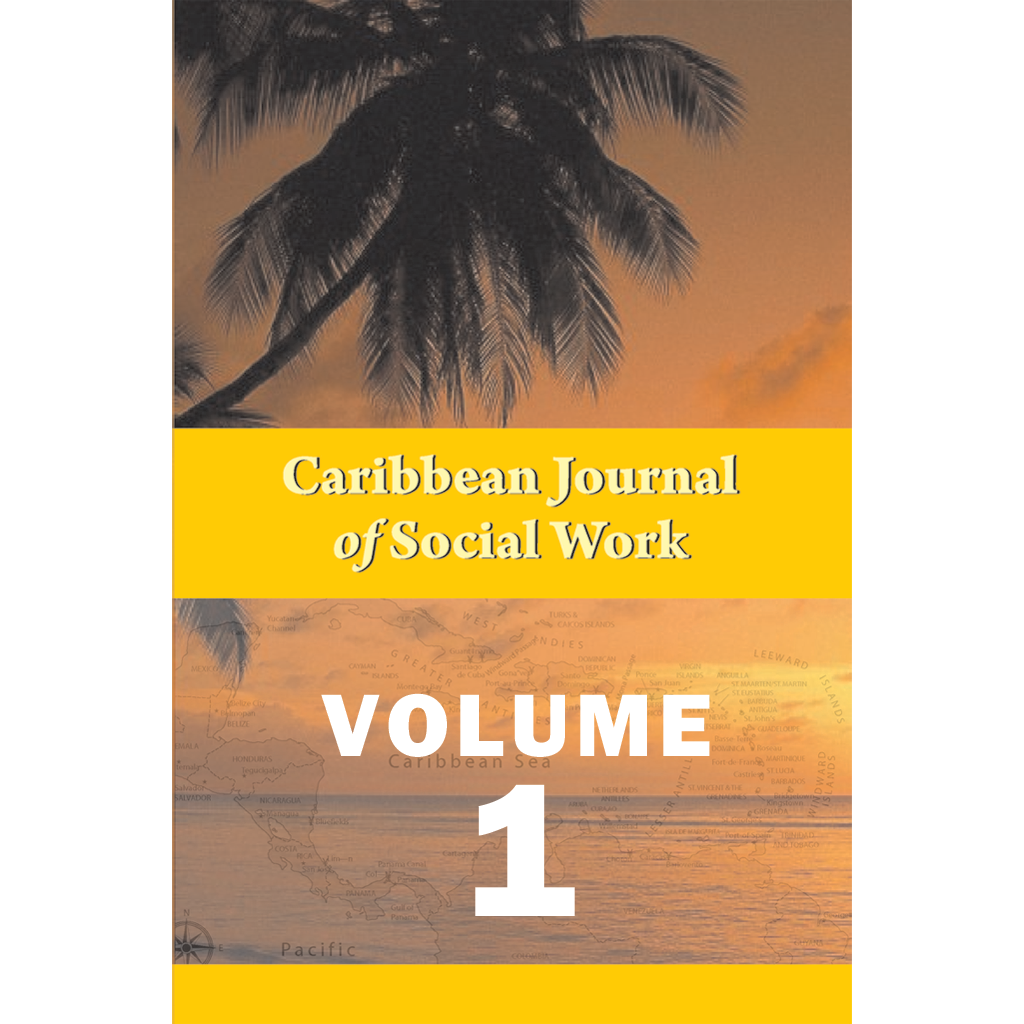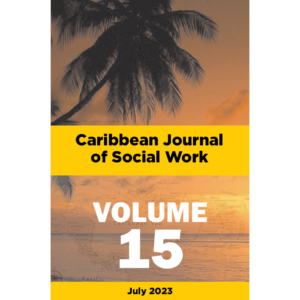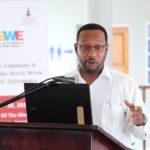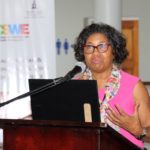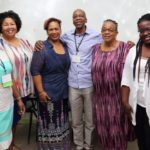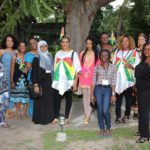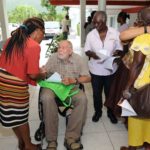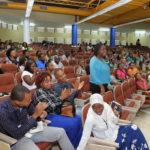Description
This edition of the Caribbean Journal of Social Work signals our move into the online environment thereby making its contents accessible to a wider readership. We wish to draw readers’ attention to our revised editorial policy which reaffirms our intention to advance and position social work scholarship in the Caribbean and globally. The CJSW provides academics, practitioners, and students, with access to research, conceptual and theoretical work and contemporary debates about issues of relevance to the Caribbean, its Diaspora and those with an interest in social policy and social work practice in developing states.
Click Here to download the full journal
Table of Contents
| Editorial Tracie Rogers |
v |
| Section A: General Papers | |
| Is this ‘White People ting’? Exploring Perceptions of Cultural Relevance of Social Work Principles in Trinidad and Tobago Akilah Riley-Richardson |
01 |
| Conceptualizing Child Maltreatment and Human Development Using the Human Capability Approach Clementia Eugene, Tobi Graafsma, and Manan R. Sanches |
14 |
| Evaluative Case Study of the Clinical Processes in a Jamaican Place of Safety Rosanna Joseph-Cardines |
38 |
| Child Protection, Paternalism and Participation: Reframing Children’s Participation in Care- A Case Study from Trinidad and Tobago Khadijah Williams |
58 |
| Cost of Professional Caring: Exploring Concepts Associated with Secondary Exposure to Trauma Arna Elliott-Rattray |
81 |
| Service-provider Perspectives on Homelessness Services in Jamaica: Implications for Social Work Practice and Policy Development Shauna Kimone Porter |
91 |
| ‘One Han Cyan Clap’: Exploring the Parallels Between Social Work and Social Action Theatre in Jamaica Shawna-Kae Burns |
108 |
| Birdie Yashika Graham |
121 |
| Caring for the Deeply Forgetful: Commentary on “Birdie” Sandra Latibeaudiere |
129 |
| Section B: Research with Marginalised Populations | |
| Reflections of a Doctoral Student Using Participatory Action Research with Deported Men in Trinidad and Tobago Cheryl-Ann Boodram |
133 |
| Social Work’s Commitment to Change: Participatory Action Research as Practice with Marginalised Groups in the Caribbean Tracie Rogers |
145 |
| Book Reviews | |
| The Confounding Island Written by Orlando Patterson Reviewed by Lynne Healy |
164 |
| Call for Papers | 168 |
Editorial Board and Review Panel
|
JOINT-EDITORS Dr. Peta-Ann Baker TECHNICAL EDITORS Mr. Verol Billett ADMINISTRATOR EDITORIAL BOARD Ms. Cerita Buchanan Dr. Duane Edwards Ms. Eva Forde Professor Lynne Healy Dr. Cynthia Langtiw Dr. Maud Mthembu Dr. Darrin Wright |
REGIONAL REVIEW PANEL Mrs. Sharon-Rose Gittens Ms. Kareen Guscott Mr. Horace Levy Dr. Anthea Octave Mrs. Rose Robinson-Hall Dr. Anna Perkins Ms. Jolene Romain Ms. Olivene Thomas Dr. Eleanor Wint Mr. Alex Vega |
INTERNATIONAL REVIEW PANEL Dr. Errol Bolden Dr. Sylvester Bowie Dr. Thomas Felke Dr. Emorcia Hill Dr. Tamarah Moss Dr. Delores Mullings Dr. Kendra Pitt Dr. Valerie Thompson-Ebanks |
Focus and Scope
The Caribbean Journal of Social Work (CJSW), is an annual publication and the official journal of the Association of Caribbean Social Work Educators (ACSWE), founded in 2001. We are committed to publishing quality scholarly and creative work that reflects on, analyses, theorises or illuminates the lived experiences of Caribbean people within and outside of the region. The CJSW is dedicated to advancing social work as an academic discipline and a field of professional practice. We have an interest in work that stimulates critical, multi-level, multi-systemic thinking about human and social development in our societies. The CJSW is open to consider work in a variety of forms which has been produced using rigorous quantitative, qualitative, participatory or reflexive approaches. We welcome submissions from social work academics, educators, scholars, and practitioners, as well as from members of other fields and disciplines. We are also committed to supporting the efforts of early career scholars and graduate students. The journal is especially interested in work that privileges the voices and identities of Caribbean people and lends support to the creation of more just societies.
Peer Review Process: The CJSW uses a two-step review process. The editors initially evaluate each article to ensure that it meets the journal’s policy guidelines, as well as satisfies the standards for an academic publication. If the author’s submission meets the criteria, it is then sent for peer review. We are committed to maintaining a respectful tone in our communications with authors.
Journal Contact Information: The Editors, The Caribbean Journal of Social Work, c/o The Social Work Training and Research Centre, The UWI Open Campus, Mona, Kingston 7, Jamaica or cjsw.acswe@gmail.com.
SUBSCRIPTIONS
The first two issues of the online edition of the Journal, beginning in 2021, will be open access. Access to subsequent issues may be at a cost. Print editions can be provided. For costs and ordering instructions, please email cjsw.acswe@gmail.com.
PERMISSION TO REPRODUCE
No part of this publication may be reproduced or distributed for sale. The copyright of individual articles remains with the author(s). Fair use principles apply to copying for educational or research purposes. In this case, fair use means that no more than 10% of any article or the Journal itself may be copied.
The copyright holders have authorised the CJSW to give permission for redistribution or reproduction of the Journal or any individual item under such terms as they shall specify.
ISSN: 0799 1215
@ 2021 Association of Caribbean Social Work Educators. All rights reserved.
Editorial
Title: New Scholars, New Scholarship
Extract
This volume of the Caribbean Journal of Social Work, themed New Scholars New Scholarship, highlights the work of regional educators and practitioners who have qualified in social work at either the Masters or Doctoral level in the past decade. An urgency for cultural relevance in the applicability of social work practice and policy interventions is echoed throughout this volume. The authors featured reflect scholar-activist, practitioner, and policy approaches seeking to unlock our potential for competently addressing social work problems in a culturally situated manner. The offerings included are demonstrative of a commitment to confronting, grappling with and envisaging ways in which social work practice can be responsive to social conditions. The authors draw on the distinctiveness of the Caribbean ethos, disrupting the colonial gaze, questioning taken for granted global assumptions and ultimately advocating for home grown lenses, and tools with which to address our social problems
| Author(s) | Pages (PDF) | Keywords | Download |
|---|---|---|---|
| Tracie Rogers | v-viii (7–10) | View article |
Articles
Title: Is this ‘White People ting’? Exploring Perceptions of Cultural Relevance of Social Work Principles in Trinidad and Tobago
Abstract
Social Work occupies a unique role as it aims to enhance individual functioning and generate social transformation. Nonetheless, social workers in developing countries face a distinct challenge in ascertaining the relevance of Social Work to their local contexts, due to the heavy reliance on European and North American literature. In this study, social work educators and frontline social workers in Trinidad and Tobago engage in this said discourse through semi-structured interviews. Using Interpretive Phenomenological Analysis (IPA), perceptions of the relevance of social work principles to Trinidad and Tobago are explored. As participants discuss the challenges and successes faced in applying the principles to their local context, the universalizing tendency of Social Work is placed under scrutiny, and the assertion by many that Social Work practice and education is white people ting—an expression used to refer to products of North America and Europe—is discussed.
Keywords: Social work, social work practices, social work education
| Author(s) | Pages (PDF) | Keywords | Download |
|---|---|---|---|
| Akilah Riley-Richardson | 1–13 (13–25) |
social work, social work practices, social work education. |
View article |
Title: Conceptualizing Child Maltreatment and Human Development Using the Human Capability Approach
Abstract
Child maltreatment is a human rights issue and social problem for the global society. Given the scientific discourses about the Human Capability Approach as a normative and evaluative framework to measure human development that captures the quality of life, human dignity, and flourishing, this article attempts to conceptualize child maltreatment as a capability impediment. The authors contend that the Capability Approach can be explored to map out those human capabilities deprived in children who experience child maltreatment. Case studies are used to explore the correlates between child maltreatment and human development using Nussbaum’s 10 Central Human Capabilities. The article concludes that child maltreatment constitutes a human development deprivation, advocates designing a Caribbean Child Friendliness Index, and valorizes child maltreatment as an indicator for human development. Implications for social work education are highlighted, and further research is recommended.
Keywords: child maltreatment, human development, Human Capability Approach.
| Author(s) | Pages (PDF) | Keywords | Download |
|---|---|---|---|
| Clementia Eugene, Tobi Graafsma, and Manan R. Sanches | 14–37 (26–49) |
child maltreatment, human development, Human Capability Approach |
View article |
Title: Evaluative Case Study of the Clinical Processes in a Jamaican Place of Safety
Abstract
The lack of enforced regulations and clarity regarding the mandate of Places of Safety in Jamaica results in varying quality in the standards of care, staff burnout and children having long terms of stay. This study examined actual clinical processes practiced in Places of Safety in Jamaica to assess cases, make referrals and improve residents' critical clinical/behavioural issues. The case study method was used, focussing on staff perception. The final evaluation was based on the Child Development Agency's 2010 Guidance and Standards of Care for Residential Child Care Facilities. A major finding of this study was that Places of Safety faced significant challenges in meeting the therapeutic requirements—though limited—of the Standards of Care. These included lack of funding, timeliness of services and limited access to clinical staff from their supervisory agency. Staff showed remarkable commitment to residents, but felt that transitional and counselling processes needed improvement.
Keywords: institutionalization, child, alternative care, programme evaluation, Caribbean
| Author(s) | Pages (PDF) | Keywords | Download |
|---|---|---|---|
| Rosanna Joseph-Cardines | 38–57 (50–69) |
institutionalization, alternative care for children, programme evaluation. |
View article |
Title: Child Protection, Paternalism and Participation: Reframing Children’s Participation in Care- A Case Study from Trinidad and Tobago
Abstract
This article shows how children and young people in residential care demonstrate their agency in response to formal hierarchies. Based on an ethnographic study conducted in two residential child care institutions in Trinidad and Tobago, the complexities of adult–child interactions in residential care are highlighted. It discusses the need for professionals in child protection to acknowledge the diverse ways in which children contribute to their lives and the requirement for supportive relationships between adults and children. The findings are useful for informing training and culturally relevant practice related to children in residential care and has implications for transitioning young people from care into independent living. On a macro level, the research addresses concerns about residential care being oppressive for children and young people, as well as the systemic approaches that are required to make the care experience more positive and sustainable.
Keywords: Child protection, children’s participation, paternalism in care, residential child care, children’s agency, relationship-based practice, children’s participation rights
| Author(s) | Pages (PDF) | Keywords | Download |
|---|---|---|---|
| Khadijah Williams | 58-80 (70–92) |
child protection, children’s participation, paternalism in care, relationship-based practice. |
View article |
Title: Cost of Professional Caring: Exploring Concepts Associated with Secondary Exposure to Trauma
Abstract
There is a cost associated with caring. This paper seeks to examine some of the concepts associated with helping professionals who engage with persons who have experienced traumatic events. Discussions in the literature suggest both anecdotally and tangibly that helping professionals may be impacted in negative ways. The concepts associated with the negative impact include vicarious trauma, secondary traumatic stress, and compassion fatigue. Notwithstanding the negative, the cost of caring is also received as beneficial and growth oriented. In this regard, the positive impact experienced by social workers when they walk in sacred and challenging spaces with clients’ trauma materials will also be explored.
Keywords: vicarious trauma, secondary traumatic stress, compassion fatigue, burnout, social worker
| Author(s) | Pages (PDF) | Keywords | Download |
|---|---|---|---|
| Arna Elliott-Rattray | 81-90 (93–102) |
vicarious trauma, secondary traumatic stress, compassion fatigue, burnout. |
View article |
Title: Service-provider Perspectives on Homelessness Services in Jamaica: Implications for Social Work Practice and Policy Development
Abstract
This article reports on a qualitative study that explored the perspectives of service providers on homelessness services in Kingston, Jamaica. Through face-to-face interviews with 11 service providers, the study found that, overall, participants were critical of the government’s response, citing that they were out of touch with the lived experiences of homeless individuals, which resulted in weak organisational leadership and management, poor strategic decisions, and service sector fragmentation. Service providers identified the need for an expert multi sectoral task force to review and redraft the homelessness policy and legislation and determine measures to ensure the optimal use of scarce resources. Additionally, participants believed that the collective voice of social workers placed them in an ideal position to highlight the oppressive and undignified practices that marginalised the homeless.
Keywords: Homelessness, provider perspectives, Jamaica, social work
| Author(s) | Pages (PDF) | Keywords | Download |
|---|---|---|---|
| Shauna Kimone Porter | 91-107 (103–119) | homelessness, provider perspectives, social work, social policy. | View article |
Title: ‘One Han Cyan Clap’: Exploring the Parallels Between Social Work and Social Action Theatre in Jamaica
Abstract
This article discusses the use of social action theatre for social change through the lens of a social work educator and practitioner who is also a part of the Jamaican theatre community. Based on the author’s positionality, the article explores the possibilities of performance and drama as an effective tool for social change and, ultimately, social work interventions. The author explores the union of social work and social action theatre by aligning the social work engagement process with Kathryn Grushka’s Arts- Education concept of tangential visibility. The use of theatre techniques in social work practice as a teachable intervention tool is explored. The author conceptualises performance and drama as an expression of cultural and ancestral memory, and invites Caribbean social work practitioners and educators to consider the range of intervention possibilities it presents.
Keywords: social action theatre, tangential visibility, Caribbean social work education, social work practitioner, Jamaican theatre
| Author(s) | Pages (PDF) | Keywords | Download |
|---|---|---|---|
| Shawna-Kae Burns | 108-120 (120–132) |
social action theatre, tangential visibility, Caribbean social work education, Jamaican theatre. |
View article |
Title: Birdie
Extract
Nursing home hostage seeks young accomplice. Must be willing to fight and not afraid of cold water. Pays well. Names starting with C need not apply. Walk-in interviews this Sunday from 10am at Harris Memorial Home with Margaret Bird.
| Author(s) | Pages (PDF) | Keywords | Download |
|---|---|---|---|
| Yashika Graham | 121-128 (133–139) |
– |
View article |
Title: Caring for the Deeply Forgetful: Commentary on “Birdie”
Extract
You would not expect Birdie, a woman with dementia, to cause such a stir using her pen and wit. And so, care workers who do not understand the disease and its stages will not know what to make of her and how to deal with her behaviour.
| Author(s) | Pages (PDF) | Keywords | Download |
|---|---|---|---|
| Sandra Latibeaudiere | 129-131 (140–143) |
– |
View article |
Title: Reflections of a Doctoral Student Using Participatory Action Research with Deported Men in Trinidad and Tobago
Abstract
Participatory action research (PAR) presents academics with a possibility, through research, to engage marginalized groups of people in uncovering authentic knowledge and action towards social change. This paper discusses my doctoral social work experiences conducting PAR with deported men in Trinidad and Tobago. The data is presented from an autoethnographic analysis of my own field notes during the PAR project. The paper provides insight into my motivations, the challenges encountered and the outcomes of using PAR for my doctoral research. I contend that, despite the challenges encountered, PAR is suited as a viable option for doctoral social work research students.
Keywords: Participatory action research, doctoral student, PhD, social work
| Author(s) | Pages (PDF) | Keywords | Download |
|---|---|---|---|
| Cheryl-Ann Boodram | 133-144 (145–156) |
participatory action research, doctoral student, PhD, social work. |
View article |
Title: Social Work’s Commitment to Change: Participatory Action Research as Practice with Marginalised Groups in the Caribbean
Abstract
This article presents an argument for participatory action research (PAR) as a pertinent methodology for Caribbean social work researchers. The synergies and capacities of both PAR and social work practice for engaging marginalised populations are discussed, with specific reference to their histories of working with disenfranchised groups. Reflecting on collaborative engagement across two PAR studies, the ways in which PAR functioned as social work practice are discussed. Four mechanisms used in the PAR studies to foster engagement, namely reflective practice, creating dialogical spaces, critical reflection, and research dissemination, are examined by considering how they support crucial processes for both research participants and research audiences. A discussion on epistemology and ethics as it relates to engagement in PAR is also included. The social work researcher engaged in PAR is discussed as a practitioner engaged in a change process intervening across the micro / macro divide to gather data and translate knowledge into action.
Keywords: social work research, PAR, social work practice, marginalized groups
| Author(s) | Pages (PDF) | Keywords | Download |
|---|---|---|---|
| Tracie Rogers | 145-163 (157–175) |
social work research, participatory action research, social work practice, marginalized groups. |
View article |
Title: Book Review: The Confounding Island by Orlando Patterson
Extract
The Confounding Island: Jamaica and the Postcolonial Predicament by Patterson (2019) has much to offer social work academics and policy makers who have an interest in Jamaica or in the Caribbean more widely. As the book title suggests, Patterson is particularly interested in the many contradictions that Jamaica poses and the “outsized” impact of this small country in a number of areas, good and bad. The volume draws heavily on sociological theory and is thoroughly referenced. The extensive reference section is a helpful resource for anyone wanting to explore more about Jamaica’s development.
| Author(s) | Pages (PDF) | Keywords | Download |
|---|---|---|---|
| Reviewed by Lynne Healy | 164-167 (176–179) |
– |
View article |
